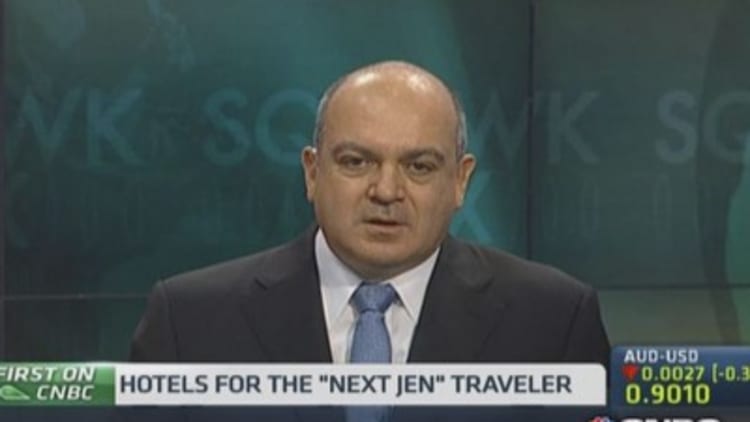
International hotel chain Shangri-La Hotels & Resorts remains committed to luxury despite growing concerns about weak fundamentals in the Chinese hotel market, including overcapacity and the impact of an anti-graft crackdown.
On Monday, Shangri-La launched 'Hotel Jen' – a more affordable brand of hotels aimed at customers with a 'millennial mindset.' It plans to open seven hotels this year, and three in the first quarter of 2015.
But the move does not signal a shift away from luxury, Shangri-La President and CEO Greg Dogan told CNBC's Asia's "Squawk Box" on Monday.
Read MoreWhy '4-Stars' is the new '5-Stars' for China hotels
"We're continuing with our expansion in China both in the five-star and the mid-range [segment] and our Shangri-La expansion still continues in the same light," he said.
Graft concerns
Luxury sectors in China have been hit hard by the government's anti-corruption and extravagance drive that began in 2012. Last year, 56 Chinese hotels asked to have their five-star ratings downgraded due to worries over how the drive would impact their business, Bloomberg reported.
Dogan acknowledged that the anti-graft drive had an impact on the market, but said demand for luxury remains strong.
"There has been tightening of the purses in China as we all know. I don't think it's been detrimental. We haven't seen occupancies drop [but] we've seen rates drop because the mix has changed. It will continue," he said.
Dogan said that Shangri-La's decision to launch a mid-range hotel chain was based on this shifting mix, and the new chain targets a growing group of consumers that are looking for a 'fuss free' style of hotel.
Simon Cooper, president & managing director of Asia Pacific at Marriott International, also shrugged off concerns about the impact of the anti-graft drive at the World Economic Forum last week.
Read MoreLuxury retailer: China graft crackdown won't hurt us
He told CNBC the drive was having more of an impact on government officials than Chinese consumers: "We are certainly finding in the major cities, especially in the new central business districts, they still want to do luxury hotels for the broad international traveler and frankly for the Chinese consumer."
Overcapacity
Overcapacity has long been flagged as a headwind for the China hotels market; according to China's Tourist Hotel Association, the average occupancy at international brand hotels in China is just over 50 percent.
In its earnings report last month, Shangri-La said it was challenged by weak demand and increased competition on the mainland, where it has the majority of its properties, in addition to a weaker yuan and start-up losses for new hotels.
Read MoreLuxury hotelier: Oversupply is a big issue for China
Dogan does not see overcapacity as a major issue, however: "I still believe that China has a huge potential and the growth of the hotel industry will continue. If you look at all the hotels and the business over the years it's been cyclical and I think that we are now coming out of a low end cycle," he said.
"If we look at the forecast for the next few months we definitely see light at the end of the tunnel, particularly in Beijing and Shanghai and the rest of the major Chinese cities, so I'm not too pessimistic," he added.


